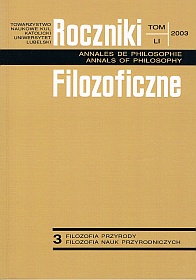The Puzzle of Naturalism
Abstract
Naturalism is a philosophical doctrine assuming that all that exists is natural, that is, that there are no spiritual realities, no purely spiritual substances, no supernatural beings, transcendent in relation to the world. In epistemology it is said that no correct and convincing arguments can be formulated for existence of this kind of objects. The general thesis of naturalism is concerned with a discussion on theism and atheism, a discussion on the ontological status of the human mind, a discussion coming from the area of philosophy of biology, from the area of ethics and axiology, and even a discussion of the issue of how the objects of formal sciences exist. Naturalism is rather a conclusion from accumulation of arguments from various branches of knowledge than a self-dependent philosophical conviction. In the course of the considerations the following issues will be dealt with: historical background of naturalism, ontological and methodological naturalism, naturalism in axiology, epistemology, in social sciences and philosophy of the mind, relations between naturalism and physicalism, materialism, emergentism and functionalism.
Opponents of naturalism usually try to show that within one or another branch of knowledge naturalism cannot be maintained, and on this basis they assume that naturalism as awhole is false. In the present considerations a different method of anti-naturalist argumentation has been used, namely, a fictitious thesis has been accepted, that as result of future development of scientific knowledge naturalism in all the branches will be considered as a convincing point of view and will be generally accepted. The phrase „puzzle of naturalism” used in the title is supposed to suggest that even in such a situation the general thesis of naturalism will not result from acceptance of particular naturalisms in all branches of knowledge. In other words, conceivable complete explanative successes achieved in particular branches of knowledge will not give the right to draw a general naturalistic conclusion. Hence the thesis of auniversal naturalism will remain puzzling.
References
Bieri P.: Generelle Einführung. W: Analytische Philosophie der Erkenntnis. Hrsg. vonP.Bieri. Frankfurt am Main: Athenäum 1986.
Campbell D. T.: Evolutionary Epistemology. W: The Philosophy of Karl Popper. Vol.1. Ed. P. A. Schilpp. La Salle: Open Court 1974 s. 47-89.
Davidson D.: Mental Events. W: tenże. Essays on Actions and Events. Oxford: Oxford University Press 1980 s.207-227 (tł. pol. T. Baszniak. Zdarzenia mentalne. W: D.Davidson. Eseje o prawdzie, języku i umyśle. Wybrała i wstępem poprzedziła B.Stanosz. Warszawa: Wydawnictwo Naukowe PWN 1992 s. 163-193).
Everitt N., Fisher A.: Modern Epistemology: A New Introduction. New York: McGraw-Hill, Inc. 1995.
Feyeraben d P. K.: Against Method. London: New Left Books 1975.
Fodor J. A.: Psychological Explanation: An Introduction to the Philosophy of Psychology. New York: Random House 1968.
Gawlick G.: Naturalismus. W: Historisches Wörterbuch der Philosophie. Bd. 6. Hrsg. von J. Ritter. Darmstadt: Wissenschaftliche Buchgesellschaft 1984 kol. 517-519.
Hare R.: The Language of Morals. Oxford: Clarendon Press 1952.
Judycki S.: Umysł i synteza. Argument przeciwko naturalistycznym teoriom umysłu. Lublin: RW KUL 1995.
Kitcher Ph.: The Naturalists Return. „Philosophical Review” 101:1992 No. 1 s. 53-114.
Kuhn Th. S.: The Structure of Scientific Revolutions. Chicago: University of Chicago Press 1962 (tł. pol. H. Ostromęcka. Struktura rewolucji naukowych. Warszawa: PWN 1968).
McGinn C.: Problems in Philosophy: The Limits of Inquiry. Oxford: Blackwell 1993.
Mclaughlin B.: The Rise and Fall of British Emergentism. W: Emergence or Reduction. Ed. A. Beckermann, H. Flohr, J. Kim. Berlin: De Gruyter 1993 s. 49-93.
Naturalism: A Critical Appraisal. Ed. S. J. Wagner, R. Warner. Notre Dame: University of Notre Dame 1993.
Nielsen K.: Naturalistic Explanations of Theistic Belief. W: A Companion to Philosophy of Religion. Ed. Ph. L. Quinn, Ch. Taliaferro. Cambridge, MA: Blackwell 1997 s. 402-409.
Popper K.: Die Logik der Forschung. Wien: Springer 1935.
Popper K.: The Logic of Scientific Discovery. London: Hutchinson 1959 (tł. pol. U. Niklas. Logika odkrycia naukowego. Warszawa: PWN 1977).
Popper K.: Objective Knowledge: An Evolutionary Approach. Oxford: Clarendon Press 1972 (tł. pol. A. Chmielewski. Wiedza obiektywna. Ewolucyjna teoria epistemologiczna. Warszawa: PWN 1992).
Putnam H.: Minds and Machines. W: Dimensions of Mind. Ed. S. Hook. New York: Collier Books 1960.
Quine W. V. O.: Epistemology Naturalized. W: tenże. Ontological Relativity and Other Essays. New York: Columbia University Press 1969 s. 69-90 (tł. pol. B. Stanosz. Epistemologia znaturalizowna. W: W. V. O. Quine. Granice wiedzy i inne eseje filozoficzne. Red. B. Stanosz. Warszawa: PIW 1986 s. 106-125).
Quine W. V. O.: The Roots of Reference. La Salle: Open Court 1974.
Ruse M.: Takinkg Darwin Seriously. Oxford: Blackwell 1986.
Copyright (c) 2003 Roczniki Filozoficzne

This work is licensed under a Creative Commons Attribution-NonCommercial-NoDerivatives 4.0 International License.





